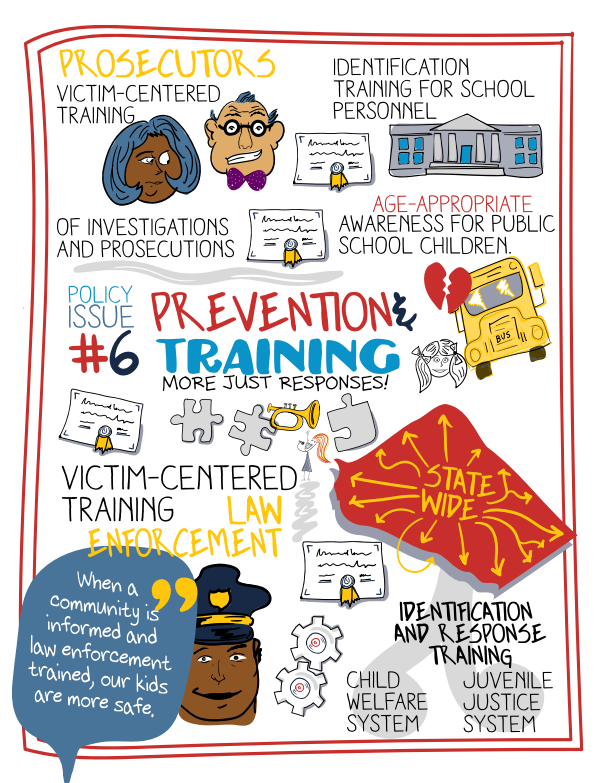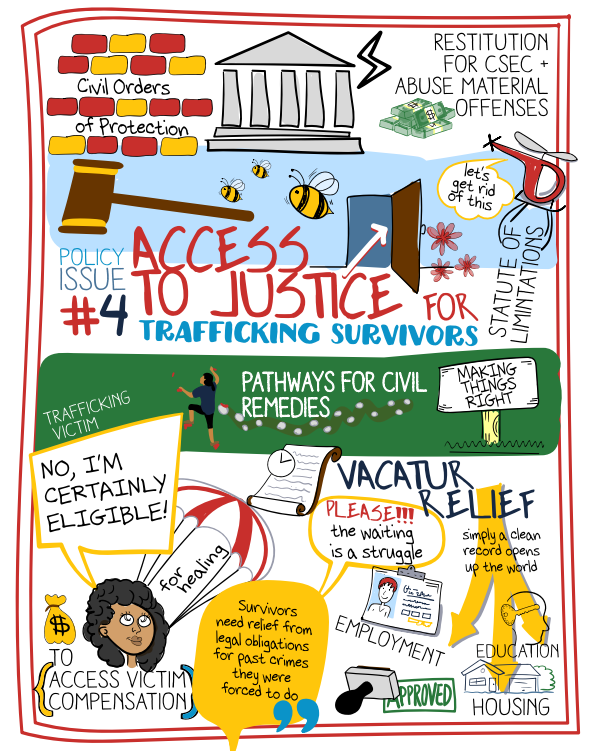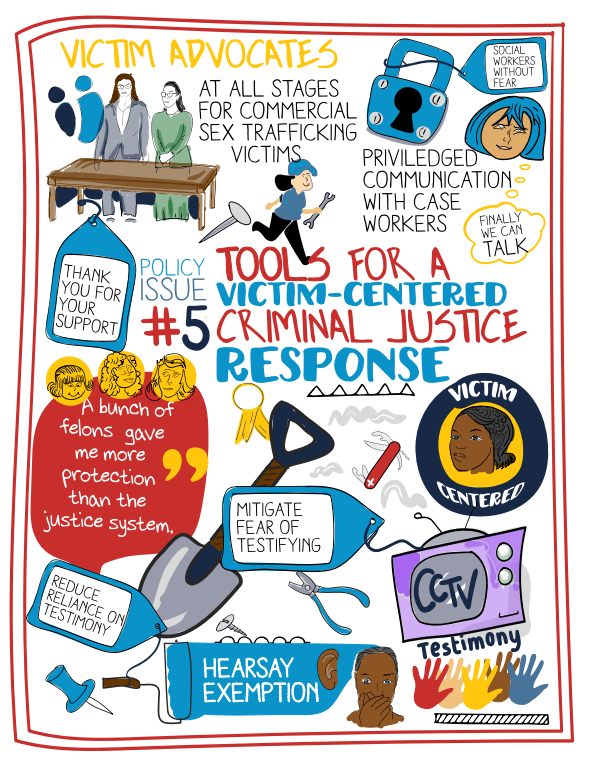Dr. Marian Hatcher
Shared Hope Policy Consultant
Ambassador-at-Large, United Nations
This blog addresses two bills which recently passed the House through their incorporation into the National Defense Authorization Act (NDAA). If the NDAA is passed by Congress with these provisions, this would significantly increase a survivor’s quality of life by addressing credit and housing concerns for those impacted by trafficking.
The first bill is the Debt Bondage Repair Act (DBRA), which was also introduced in the Senate. The DBRA addresses the difficulties that trafficking survivors face in obtaining financial freedom due to low credit scores caused by their victimization. The terms “good credit” and “credit score” by design define and measure success or failure, determining what you can buy and where you can live. Survivors of sexual exploitation are very often not in control of what appears on their credit report due to coercion by exploiters. This leaves them with crushing debt and limited options for acquiring loans necessary for future opportunities.
The second bill is the Trafficking Survivors Housing Act (TSHA), which has been introduced in the House and Senate and would provide a roadmap for increasing trafficking survivors’ access to short- and long-term housing, both of which are critical to stabilization, increased safety and an overall sense of normalcy and wellbeing.
The key provisions of both the DBRA and the TSHA are currently in the non-defense section of the (NDAA) under sections 5104 and 5113. It is critical they remain there.
Specifically, the DBRA, initially referred to the Senate in June 2021, would prohibit consumer reporting agencies from furnishing a consumer report containing any adverse item of information about a consumer if such consumer is a victim of trafficking and the adverse report resulted from the trafficking victimization.
This legislation is close to my heart, as it was inspired by my testimony given last spring to the U.S. House Committee on Financial Services. Ranking Member Patrick McHenry understood how the impact of a vehicle purchased in my name for my exploiter, which was/is still reflected on my credit report from nearly 20 years ago, has harmed both my credit history and my emotional wellbeing.
Most importantly, the DBRA provides survivors an opportunity for financial independence and stability that can help end the cycle of exploitation.
Good credit history is essential for opening bank accounts and applying for loans, credit cards, insurance, and housing. Credit reports are also sometimes necessary when applying for student loans, and utility and cellphone service contracts. Individuals with adverse credit history and low credit scores experience higher interest rates or denial altogether.
The TSHA is equally as important as it would require the United States Interagency Council on Homelessness to coordinate with key federal stakeholders, housing advocates, service providers and survivors and others to study the availability of housing or survivors of trafficking, and those at risk of trafficking due to homelessness or housing insecurity.
When examining the consequences of exploitation, it is often the immediate needs that are addressed in a coordinated manner, and rightly so. It is however critical to look at the long-term impact on victims and survivors as these two bills will do.
In 2019, two of the top five risk factors for trafficking victimization were being a runaway or homeless youth and unstable housing.[i] The lack of affordable and accessible housing is also a critical barrier to aiding victims in leaving their trafficking situation and providing services to trafficking survivors. However, to address this complex issue as part of a comprehensive approach to combatting trafficking, research is needed to better understand the specific housing gaps and barriers to accessing housing that trafficking survivors experience.
A 2002 study by the Chicago Coalition for the Homeless, Unlocking Options For Women, that surveyed 235 women in Cook County Jail, helps to demonstrate the likely prevalence of homelessness among trafficking survivors and those at risk of sex trafficking, and the resulting need to better understand how to respond to this growing problem. When looking at prostitution and homelessness “[a] majority (58 percent) of women who stated they were homeless in the 30 days prior to entering Cook County Jail reported being regularly involved in prostitution. Of those, 26 percent regularly prostituted for a place to stay. Thirty-one percent of women who said they were regularly involved in prostitution had experienced homelessness before the age of 18.” Addressing housing is also critical from a prevention perspective, as individuals experiencing housing instability and homelessness are more likely to become trafficking victims. 64% of trafficking survivors reported being homeless or experiencing unstable housing when they were recruited.[ii] Vulnerable populations are also disproportionately impacted by the absence of accessible and affordable housing. In one study, 68% of child trafficking survivors reported they were homeless when they had been trafficked and engaged in commercial sex, including exchanging sex acts to meet basic needs such as housing.[iii] Foster youth aging out of the system are also at higher risk of homelessness and becoming trafficking victims.[iv] Additionally, LGBTQ youth experience homelessness at twice the rate of non-LGBTQ youth.[v] Evaluating the most effective methods to providing at-risk individuals with stable housing is critical to taking a proactive and preventative approach to human trafficking.
The TSHA is also crucial to establishing effective approaches for providing survivors with housing after they leave their exploitative situations. Between December 2007 and December 2017, 37% of referral and crisis assistance requests to the National Human Trafficking hotline were for housing needs.[vi] Additionally, 47% of crisis needs were emergency shelter requests, and 40% of survivors reported seeking shelter.[vii] Failure to access housing may also keep trafficking victims in their exploitative situations. In one study, 64% of survivors reported the absence of affordable housing was a barrier to leaving their trafficking situation.[viii]
For survivors searching for an apartment or house, almost every application requires a “credit check.” It is at this moment in a survivor’s life that the impact of these bills intersect. To provide survivors access to affordable housing and financially stable and independent future, there must be access to safe and stable housing and a fair credit check that is free from the impact that debt bondage had on the survivor consumer–reflecting the legitimate credit history of the survivor and not of their trafficker. To accomplish this, Congress must pass both of these critical protections for survivors.
Without bills like this, survivors will continue to be impacted by their prior exploitation and deemed not “credit worthy,” resulting in persisting economic inequity, homelessness, and barriers to financial stability. I call on Congress to take up these issues and ensure the NDAA proceeds to provide these necessary supports that survivors so greatly need to fully recover from their trafficking victimization.
Dr. Hatcher has worked as a civilian member of law enforcement at the Cook County Sheriffs’ Office for 15 years, a U.S. Representative of SPACE International (Survivors of Prostitution Calling for Enlightenment), a survivor organization representing 10 countries. She is a recipient of numerous awards including the 2014 Shared Hope International Path Breaker Award, the 2016 Presidential Lifetime Achievement Award from President Obama, and was honored on Congressional Record for Black History by U.S. Senator Richard Durbin of IL.
[i] Runaway homeless youth and unstable housing ranked second and fourth, respectively. Polaris, 2019 Data Report, Polaris Project, https://polarisproject.org/wp-content/uploads/2019/09/Polaris-2019-US-National-Human-Trafficking-Hotline-Data-Report.pdf (last visited June 11, 2021).
[ii] Polaris, Housing & Homelessness Systems, Polaris Project 16 (July 2018), https://polarisproject.org/wp-content/uploads/2018/08/A-Roadmap-for-Systems-and-Industries-to-Prevent-and-Disrupt-Human-Trafficking-Housing-and-Homelessness-Systems.pdf.
[iii] Laura T. Murphy, Labor and Sex Trafficking Among Homeless Youth, 6 (2016), https://www.covenanthouse.org/sites/default/files/inline-files/Loyola%20Multi-City%20Executive%20Summary%20FINAL.pdf.
[iv] Murphy, supra note 4, at 6.
[v] Chapin Hall, Missed Opportunities: LGBTQ Youth Homelessness in America, 7 (Apr. 2018) https://voicesofyouthcount.org/wp-content/uploads/2018/05/VoYC-LGBTQ-Brief-Chapin-Hall-2018.pdf.
[vi] Polaris, supra note 3, at 24.
[vii] Polaris, supra note 3, at 24.
[viii] Polaris, supra note 3, at 21.
 ex trafficking from the outset can also be accomplished by educating students themselves, giving them the tools to avoid trafficking exploitation.
ex trafficking from the outset can also be accomplished by educating students themselves, giving them the tools to avoid trafficking exploitation. When survivors are not appropriately recognized in statute, they are often prevented from receiving the services and protections they need to pursue justice and, consequently, experience further harm in trying to move beyond there victimization.
When survivors are not appropriately recognized in statute, they are often prevented from receiving the services and protections they need to pursue justice and, consequently, experience further harm in trying to move beyond there victimization. For many survivors of child and youth sex trafficking, trauma continues far beyond the exploitation itself and often throughout the resulting criminal justice response. To build a case against exploiters, survivors are often asked to reshare their experience, often in front of others, without an advocate to support them. To create a more survivor-centered and trauma-centered environment, state laws should provide several alternative mechanisms for survivors to be protected when serving as a victim-witness, ensuring they feel as comfortable and safe as possible when participating in criminal justice processes.
For many survivors of child and youth sex trafficking, trauma continues far beyond the exploitation itself and often throughout the resulting criminal justice response. To build a case against exploiters, survivors are often asked to reshare their experience, often in front of others, without an advocate to support them. To create a more survivor-centered and trauma-centered environment, state laws should provide several alternative mechanisms for survivors to be protected when serving as a victim-witness, ensuring they feel as comfortable and safe as possible when participating in criminal justice processes.





